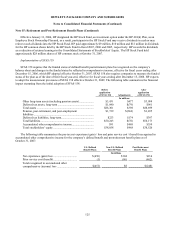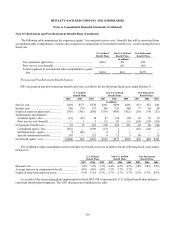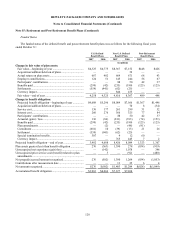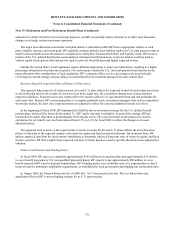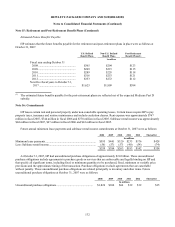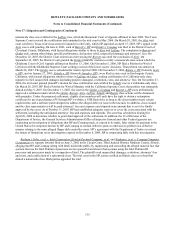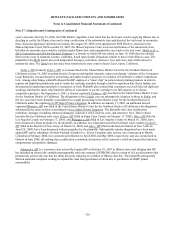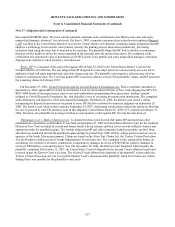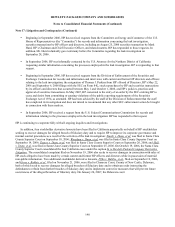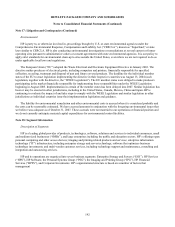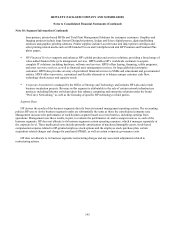HP 2007 Annual Report Download - page 149
Download and view the complete annual report
Please find page 149 of the 2007 HP annual report below. You can navigate through the pages in the report by either clicking on the pages listed below, or by using the keyword search tool below to find specific information within the annual report.
HEWLETT-PACKARD COMPANY AND SUBSIDIARIES
Notes to Consolidated Financial Statements (Continued)
Note 17: Litigation and Contingencies (Continued)
nationwide class was certified in the LaPray case, which the Beaumont Court of Appeals affirmed in June 2002. The Texas
Supreme Court reversed the certification and remanded to the trial court in May 2004. On March 29, 2005, the Alvis trial
court certified a Texas-wide class action for injunctive relief only, which HP appealed on April 15, 2005. HP’ s appeal in the
Alvis case is still pending. On June 4, 2003, each of Barrett v. HP and Grider v. Compaq was filed in the District Court of
Cleveland County, Oklahoma, with factual allegations similar to those in Alvis and LaPray. The complaints in Barrett and
Grider seek, among other things, specific performance, declaratory relief, unspecified damages and attorneys’ fees. On
December 22, 2003, the District Court entered an order staying the Barrett case until the conclusion of Alvis. On
September 23, 2005, the District Court granted the Grider plaintiffs’ motion to certify a nationwide class action which the
Oklahoma Court of Civil Appeals affirmed on October 13, 2006. On November 5, 2006, HP filed a Petition for Writ of
Certiorari with the Oklahoma Supreme Court seeking reversal of the lower courts’ decisions. That petition was denied on
March 26, 2007. The Grider case is scheduled for trial in April of 2008. On November 5, 2004, Batiste v. HP (formerly Scott
v. HP), and on January 27, 2005, Schultz v. HP (formerly Jurado v. HP), were filed in state court in San Joaquin County,
California, with factual allegations similar to those in LaPray and Alvis, seeking certification of a California-only class,
injunctive relief, unspecified damages (including punitive damages), restitution, costs, and attorneys’ fees. On November 27,
2006, the trial court granted plaintiff’ s motion for class certification and certified the Schultz case as a California-only class.
On March 26, 2007, HP filed a Petition for Writ of Mandate with the California Supreme Court; that petition was summarily
denied on May 9, 2007. On December 11, 2007, the court in the Grider v. Compaq and Barrett v. HP cases preliminarily
approved a settlement under which the Grider, Barrett, Alvis, LaPray, Schultz and Batiste class actions will be dismissed
with prejudice. Under the proposed settlement, eligible class members will each have the right to obtain a redemption
certificate for use in purchasing a PC through HP’ s website; a USB flash drive as long as the class member meets certain
requirements; and a software patch designed to address the alleged defect at issue in the lawsuits. In addition, class counsel
and the class representatives will be paid attorneys’ fees and expenses and stipends in an amount that is yet to be finally
approved by the court. As of October 31, 2007, HP had established adequate reserves to cover the costs associated with the
settlement, including the anticipated attorneys’ fees and expenses and stipends. The court has scheduled a hearing for
April 29, 2008 to determine whether to grant final approval of the settlement. In addition, the Civil Division of the
Department of Justice, the General Services Administration Office of Inspector General and other Federal agencies are
conducting an investigation of allegations that HP and Compaq made, or caused to be made, false claims for payment to the
United States for computers known by HP and Compaq to contain defective parts or otherwise to perform in a defective
manner relating to the same alleged floppy disk controller errors. HP’ s agreement with the Department of Justice to extend
the statute of limitations on its investigation expired on December 6, 2006. HP is cooperating fully with this investigation.
Barbara’s Sales, et al. v. Intel Corporation, Hewlett-Packard Company, et al. and Neubauer, et al. v. Compaq Computer
Corporation are separate lawsuits filed on June 3, 2002 in the Circuit Court, Third Judicial District, Madison County, Illinois,
alleging that HP and Compaq (along with Intel) misled the public by suppressing and concealing the alleged material fact that
systems that use the Intel Pentium 4 processor are less powerful and slower than systems using the Intel Pentium III
processor and processors made by a competitor of Intel. The plaintiffs seek unspecified damages, restitution, attorneys’ fees
and costs, and certification of a nationwide class. The trial court in the HP action certified an Illinois class as to Intel but
denied a nationwide class. Both parties appealed the trial
135


